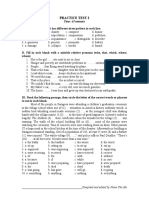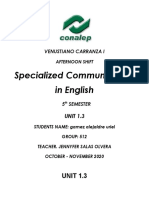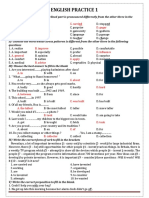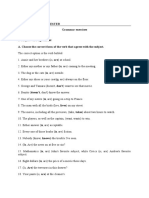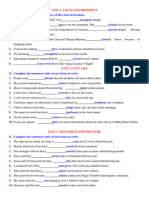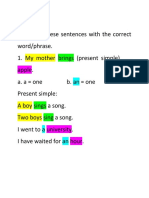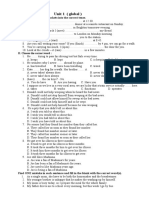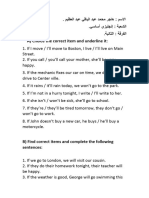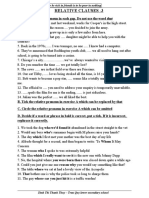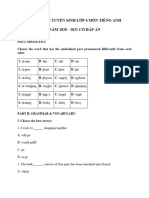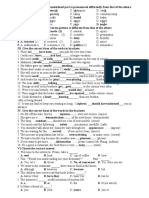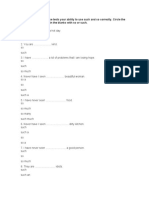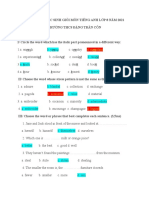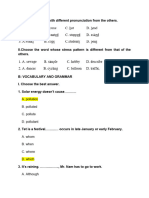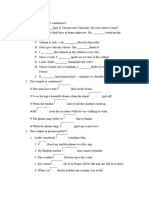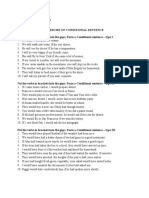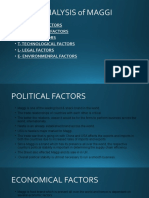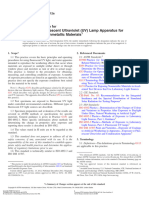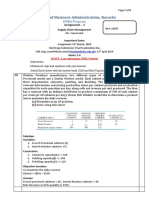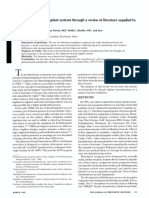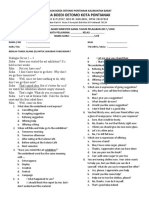I Had An Amusing Experience Last Year I Had Left A Small Village in The South of France He Had Got Into The Car I Had Nearly Reached The Town
I Had An Amusing Experience Last Year I Had Left A Small Village in The South of France He Had Got Into The Car I Had Nearly Reached The Town
Uploaded by
steveen arboledaCopyright:
Available Formats
I Had An Amusing Experience Last Year I Had Left A Small Village in The South of France He Had Got Into The Car I Had Nearly Reached The Town
I Had An Amusing Experience Last Year I Had Left A Small Village in The South of France He Had Got Into The Car I Had Nearly Reached The Town
Uploaded by
steveen arboledaOriginal Title
Copyright
Available Formats
Share this document
Did you find this document useful?
Is this content inappropriate?
Copyright:
Available Formats
I Had An Amusing Experience Last Year I Had Left A Small Village in The South of France He Had Got Into The Car I Had Nearly Reached The Town
I Had An Amusing Experience Last Year I Had Left A Small Village in The South of France He Had Got Into The Car I Had Nearly Reached The Town
Uploaded by
steveen arboledaCopyright:
Available Formats
ENGLISH DEPARTMENT
THIRD CONDITIONAL – PAST PERFECT WORKSHOP
9TH GRADE THIRD TERM
2019 – 2020
NAME: Steveen arboleda valens 9D DATE: Abril/3/2020
A) Read the situations and write sentences in the past perfect using the same words and without
changing the meaning of the sentence.
1. I arrived at the party at 9 p.m. but Jane was already there.
R// I had arrived at the party t 9 p.m. but Jane was aleady there
2. I invited Jeff to come for lunch but he wasn't hungry.
R// I had invited Jeff to come for lunch but he wasn't hungry
3. Jane was late for her exam. All the other students were already there.
R// Jane had been late for her exam. All the other students were already there
4. Mike got home after midnight. The house was quiet.
R// Mike had gotten home after midnight. The house was quiet
5. I rang Fred but he wasn't at home.
R// I had rung Fred but he wasn't at home
B) Complete a suitable PAST PERFECT TENSE:
1. They had gone (go) home after they had finished (finish) their work.
2. She had just gone (just / go) out when I called her.
3. My brother had eaten (eat) all the pie before we got back.
4. He wondered why I had not visited (not / visit) him before.
5. She said that she had already seen (already / see) the Pyramids.
6. The fire had spreaded (spread) to the next building .
7. They drank small cups of coffee, after they had finished (finish) dinner.
8. He told me he had catch (catch) a young lion.
9. His mother had worried (worry) a lot about him before she had heard (hear) that he was asfe.
10. He had already learned (already / learn) English before he had left (leave) for England, but before
he arrived in England, he had forgotten (forget) some.
11. Mary had been (go) swimming after she come home. After she had swum (swim), she called her
friend Judy.
12. I had been (go) to the theatre with my friends yesterday. I had not been (not / go) to the theatre fiora
year.
13. After they had finished (finish) their breakfast, they had left (leave) for school.
14. Linda had played (play) tennis after she had done (do) her homework.
15. My father had watered (water) the flowers after he had cleaned (clean) the car.
C) Read the passage underline the past perfect sentences and answer the questions:
I had an amusing experience last year. After I had left a small village in the south of France, I drove on
to the next town. On the way a young man waved to me. I stopped and he asked me for a lift. After he
had got into the car, I said good morning to him in French and he replied in the same language.
Except a few words, I do not know any French at all. Neither of us spoke during the journey.
I had nearly reached the town, when the young man suddenly said, very slowly, “Do you speak
English?” As I soon learned, he was English himself!
1. When did the writer drive on to the next town?
R// After to left a small village in the south of france
2. When did he say good morning to the man in French?
R//After he had got into the car, I said good morning to him in French
3. When did the young man say, “Do you speak English?”
R// When they almost reached the town, the French man asked him
D) Put the verbs in brackets into the correct form.
1. If Kim not missed (not / miss) her flight, she not met (not / met) her future husband Tom!
2. I not failed (not / fail) the exam if I worked (work) harder.
3. If he drived (drive) more carefully, he not had(not / have) an accident.
4. They won (win) the race if the weather conditions been (be) better.
5. What you beeen (you / do) if you seen (see) the thief steal the jewels?
E) Complete the following sentences in column A using the correct choice from column B.
A B
_e__1. Everyone on board the plane would have died a) If I had not been to a doctor.
_j__2. If the officials hadn’t stopped the poor man, b) if you had taken him to the fun-fair.
_f__ 3. If the climbers had found an easy way, c) if the plane had crashed.
_a__4. I would be in a hospital now d) she could have bought some expensive
clothes.
_g__5. We would have got wet e) so many people wouldn’t have been
killed.
_i__6. If he had had enough time last summer, f) he could have built his small house in
two days.
_c__7. I might have come to your help g) if we hadn’t taken our umbrellas.
_h__ 8. If the driver had not slept, h) they could have reached the top easily
_b__ 9. The young boy would have been very happy i) he would have gone on a holiday.
_d__10. If her father had been rich, j) if I had had time last Sunday.
F) Use the correct form to complete third conditional sentences:
1. If you had not left (not / leave) immediately, I could have called (call) the police.
2. If he had not arrived (not / arrive) soon, we would have had (have to) dinner without him.
3. I would have not had (not / have to) borrow any money from you if I had gotten (get) my salary
tomorrow.
4. If you had invited (invite) her to the dance, she could have been (be) very pleased.
5. If you had retired (retire) soon, you could have (make) yourself ill.
6. If you had writed (write) him a letter, he would have known (know) our address.
7. The buildings wouldn’t have burned to ashes if the firemen had come (come) in time.
G) write an unreal situation in the past using the third conditional structure and using the following
words in your 20 lines paragraph.
( indigenous, person, america, 16th century, wanted, europeans, find, concentrated, battles, political
figures, history, classes, past, interesting)
R// Long before the 16th century there was a conflict between people from different places, the indigenous
and the Europeans where they had heard and would have been interested about an object owned by an
Aztec "political figure". They could have reached America earlier, if they would have been more proficient
at sailing ships. Europeans looking for where they would hide the "political" figure became interested in
the battles to attract attention and find the object faster. If they had decided not to fight, they would not
have shed so much American blood.
Continuing with their desperate search for the object, they received classes on the region, culture, wealth
and other things. The Europeans, surprised by the riches of America, thought of stealing and taking all of
America, even if it cost them dearly. If they had taken all of America, they would have wiped out all and
exclusive riches of America and devastating the indigenous people would be difficult so they decided to
fight a second time, which is why most of Europeans died in the war and fell short on resources and
persons
You might also like
- English, Topic-Based Tests, Pre-Intermediate Level, Fluency PracticeFrom EverandEnglish, Topic-Based Tests, Pre-Intermediate Level, Fluency PracticeRating: 3 out of 5 stars3/5 (5)
- Human RelationsDocument10 pagesHuman RelationsRahul SharmaNo ratings yet
- AGC 150 Designers Handbook 4189341188 UK PDFDocument400 pagesAGC 150 Designers Handbook 4189341188 UK PDFRomulo GomesNo ratings yet
- Laboratorio Ingles Etapa 1Document7 pagesLaboratorio Ingles Etapa 1Karen AracelyNo ratings yet
- Cls IX IntensivDocument27 pagesCls IX IntensivhopityNo ratings yet
- 11 Sinif 1 Donem 1 Yazili 78349Document2 pages11 Sinif 1 Donem 1 Yazili 78349Furkan OkumusogluNo ratings yet
- Final Evaluation PracticeDocument4 pagesFinal Evaluation PracticeRomero Marte hernandezNo ratings yet
- Put The Verbs in Brackets Into The Gaps. Form A Conditional Sentence - Type I. Only Use The Will-Future in The Main ClausesDocument5 pagesPut The Verbs in Brackets Into The Gaps. Form A Conditional Sentence - Type I. Only Use The Will-Future in The Main ClausesNicoleta GrosuNo ratings yet
- Uriel Ga - 5th UNIT 1.3Document9 pagesUriel Ga - 5th UNIT 1.3Uriel Gamez AlejaldreNo ratings yet
- A. Past Simple: Make Positive Past Simple Sentences:: Came Stood DID Sang ATE Fell Took Found GOT SoldDocument2 pagesA. Past Simple: Make Positive Past Simple Sentences:: Came Stood DID Sang ATE Fell Took Found GOT Soldkatia alegria mendozaNo ratings yet
- Đề Luyện Số 4: mankind illness food serious necessary animalsDocument2 pagesĐề Luyện Số 4: mankind illness food serious necessary animalsNguyễn Hoàng NhậtNo ratings yet
- Connector ExerciseDocument13 pagesConnector ExerciseAnonymous TswlBz100% (1)
- Taller de Ingles Grado DecimoDocument29 pagesTaller de Ingles Grado Decimoapi-400393663No ratings yet
- 50 YesDocument66 pages50 YesHồ Ngọc TrAnhNo ratings yet
- Practice Test 2: English 9Document2 pagesPractice Test 2: English 9Pham Thu HaNo ratings yet
- Writing Bright 2 Answer KeyDocument32 pagesWriting Bright 2 Answer Keysokheang.samean1No ratings yet
- Uriel Ga - 5th UNIT 1.3Document10 pagesUriel Ga - 5th UNIT 1.3Uriel Gamez AlejaldreNo ratings yet
- English Practice 1: C. Carried D. Sugar B. Underline A. Danger A. CharacterDocument3 pagesEnglish Practice 1: C. Carried D. Sugar B. Underline A. Danger A. CharacterKeisaNo ratings yet
- Run On SentencesDocument10 pagesRun On SentencesSamuel MatsinheNo ratings yet
- Lesson 6: Exercises: I. Subject-Verb Agreement A. Choose The Correct Form of The Verb That Agrees With The SubjectDocument9 pagesLesson 6: Exercises: I. Subject-Verb Agreement A. Choose The Correct Form of The Verb That Agrees With The SubjectElias GuirrugoNo ratings yet
- Verb Forms E9Document7 pagesVerb Forms E9kimleNo ratings yet
- Additional Assignment - Unit 4Document3 pagesAdditional Assignment - Unit 4nadia layraNo ratings yet
- Meeting 8Document10 pagesMeeting 8Ratih KuswidyasariNo ratings yet
- Đề cương ôn tập HK2 Tiếng Anh 7Document8 pagesĐề cương ôn tập HK2 Tiếng Anh 7myhuyen vuNo ratings yet
- English TestDocument26 pagesEnglish TestBlanca MarquesNo ratings yet
- (WITH S4P1) BÀI TẬP TENSES (EXTRA) (N1+4)Document7 pages(WITH S4P1) BÀI TẬP TENSES (EXTRA) (N1+4)Le Ngoc QuangNo ratings yet
- Tieng Anh 10 Global SuccessDocument2 pagesTieng Anh 10 Global SuccessHà Phạm ThuNo ratings yet
- Prepositions ExercisesDocument8 pagesPrepositions ExercisesfancyfreebluebirdNo ratings yet
- Articles 1.1: The. If Zero Article Is An Alternative For The, Write TheDocument6 pagesArticles 1.1: The. If Zero Article Is An Alternative For The, Write ThePhan Đăng HảiNo ratings yet
- المستندDocument14 pagesالمستندmsyd46162No ratings yet
- Reported Speech C3Document5 pagesReported Speech C3YOseph GvNo ratings yet
- De Cuong HkiDocument11 pagesDe Cuong HkiVan DoanNo ratings yet
- BT Hien Tai PT Va QK Phan TuDocument2 pagesBT Hien Tai PT Va QK Phan Tutâm vũNo ratings yet
- AADocument8 pagesAAareenrihNo ratings yet
- De Cuong On Tuyen Sinh 2018-2019Document6 pagesDe Cuong On Tuyen Sinh 2018-2019MS HOÀINo ratings yet
- Relative Clause 3Document8 pagesRelative Clause 3AnNo ratings yet
- English Monthly Test #2 Quarter 1: Name: Grade: 6-Date: .Document6 pagesEnglish Monthly Test #2 Quarter 1: Name: Grade: 6-Date: .Huseyin KIRIKNo ratings yet
- Đề Cương Ôn Tập Học Kỳ Ii Môn: Tiếng Anh - Lớp 9 I. Vocabalary: II. grammarDocument5 pagesĐề Cương Ôn Tập Học Kỳ Ii Môn: Tiếng Anh - Lớp 9 I. Vocabalary: II. grammarnang chieu Lung linh muon hoa vangNo ratings yet
- TP 5to MMODocument2 pagesTP 5to MMONaimid LobrunoNo ratings yet
- ĐỀ ÔN THI TUYỂN SINH LỚP 6 MÔN TIẾNG ANHDocument10 pagesĐỀ ÔN THI TUYỂN SINH LỚP 6 MÔN TIẾNG ANHminhsang.artNo ratings yet
- Bien Doi Tu Loai Tien To Va Hau To Word FormationDocument10 pagesBien Doi Tu Loai Tien To Va Hau To Word Formationduc haNo ratings yet
- Mini Test Pet+fceDocument2 pagesMini Test Pet+fceThu TrangNo ratings yet
- Worksheet 2Document8 pagesWorksheet 2mfqfkdt9jyNo ratings yet
- Nivelación 11 - Primer PeriodoDocument7 pagesNivelación 11 - Primer PeriodomishellNo ratings yet
- ĐỀ 01 (30 đềDocument5 pagesĐỀ 01 (30 đềĐinh Hữu DũngNo ratings yet
- Universitatea Spiru Haret - Efs An 1 Invatamant Cu FrecventaDocument4 pagesUniversitatea Spiru Haret - Efs An 1 Invatamant Cu FrecventaBeletoiu ClaudiuNo ratings yet
- BT Phát Âm KTGK 1Document8 pagesBT Phát Âm KTGK 1196dothaoNo ratings yet
- Practice Test 3Document3 pagesPractice Test 3Pham Thu HaNo ratings yet
- BỘ 5 ĐỀ THI HỌC SINH GIỎI MÔN TIẾNG ANH LỚP 8 NĂM 2021Document24 pagesBỘ 5 ĐỀ THI HỌC SINH GIỎI MÔN TIẾNG ANH LỚP 8 NĂM 2021Alfrendo DiValencio100% (1)
- Pagcaliwagan, Beverly D. FL, ActivitiesDocument4 pagesPagcaliwagan, Beverly D. FL, ActivitiesBeverly PagcaliwaganNo ratings yet
- Hristina Vezhbi (Unit 2)Document9 pagesHristina Vezhbi (Unit 2)Andrijana GjorgjevskaNo ratings yet
- NothingDocument9 pagesNothingngochuy1106.newNo ratings yet
- Grammar Review 1Document3 pagesGrammar Review 1Lisa NguyenNo ratings yet
- Ôn OptionDocument14 pagesÔn OptionLa Thị Thúy MaiNo ratings yet
- MATURITA REVISION C With KEYDocument5 pagesMATURITA REVISION C With KEYapi-26697639No ratings yet
- StarterDocument18 pagesStarterPatricia RoblesNo ratings yet
- 4º Eso Repaso InglésDocument5 pages4º Eso Repaso Ingléselectra1986No ratings yet
- I Reading Comprehension Text ADocument5 pagesI Reading Comprehension Text ACristina Georgiana Rosu0% (1)
- Conditional Sentence NisaDocument4 pagesConditional Sentence NisaNisaNo ratings yet
- PFS-TT-2. NewDocument12 pagesPFS-TT-2. NewQuỳnh TrangNo ratings yet
- Jawaban Materi 3Document7 pagesJawaban Materi 3Aminatus MahmudahNo ratings yet
- Practice on mixed conditonelesDocument6 pagesPractice on mixed conditonelesayoubabid334No ratings yet
- Kipling, The Whites Man BurdenDocument3 pagesKipling, The Whites Man BurdenRamon VenegasNo ratings yet
- WebSphere Application Server V6.1 Web Services Problem DeterminationDocument52 pagesWebSphere Application Server V6.1 Web Services Problem DeterminationdeisecairoNo ratings yet
- Dr. Elizabeth M. GacusanaDocument2 pagesDr. Elizabeth M. GacusanaCamille100% (1)
- Application Form For Certification of BIM Managers (PN01-F-01-Adept Route) (Jan 2022)Document19 pagesApplication Form For Certification of BIM Managers (PN01-F-01-Adept Route) (Jan 2022)Ene EttehNo ratings yet
- West Bengal Government and SocietyDocument10 pagesWest Bengal Government and SocietyMadhuNo ratings yet
- Subject: Submission of Report On Corporate FinanceDocument24 pagesSubject: Submission of Report On Corporate FinanceMukit-Ul Hasan PromitNo ratings yet
- Ideas For IELTS Writing 2 - TransportDocument4 pagesIdeas For IELTS Writing 2 - Transport652283701No ratings yet
- Motion To TravelDocument2 pagesMotion To TravelBrian PrestoNo ratings yet
- Barrett Beyond Psychometrics 2003 AugmentedDocument34 pagesBarrett Beyond Psychometrics 2003 AugmentedRoy Umaña CarrilloNo ratings yet
- Scheme of Syllabus For Graphic Design: Classes Xi and XiiDocument7 pagesScheme of Syllabus For Graphic Design: Classes Xi and XiiAyush Kumar VishwakarmaNo ratings yet
- Pestle Analysis of MaggiDocument7 pagesPestle Analysis of Maggitapan mistryNo ratings yet
- ASTM G 154-2012A (Accelerated Aging)Document12 pagesASTM G 154-2012A (Accelerated Aging)rahman_adiwiriaNo ratings yet
- 3001 Service Manual Tier III DUMPERDocument216 pages3001 Service Manual Tier III DUMPERAlberto100% (1)
- Câu 4 Bao Cao LogsDocument3 pagesCâu 4 Bao Cao LogsĐắc TrườngNo ratings yet
- CRAC Unit - DBAireIII - R410A - 50-60Hz - MM0706B-0922 - Lo - 0Document40 pagesCRAC Unit - DBAireIII - R410A - 50-60Hz - MM0706B-0922 - Lo - 0Mahmoud SingerNo ratings yet
- XRF XEPOS Basic Operation Procedure PDFDocument8 pagesXRF XEPOS Basic Operation Procedure PDFCalyle DINo ratings yet
- Aarong-Products NameDocument3 pagesAarong-Products Nameovi omarNo ratings yet
- Institute of Business Administration, Karachi: EMBA ProgramDocument6 pagesInstitute of Business Administration, Karachi: EMBA ProgramRaza Ansari100% (1)
- The Filipino WayDocument4 pagesThe Filipino WayStudy FirstNo ratings yet
- Multiview Drawings NotesDocument49 pagesMultiview Drawings NotesM.rusdiananNo ratings yet
- Taskalfa 5500I Taskalfa 4500I Taskalfa 3500I: Every Document. Every Task. Every TimeDocument2 pagesTaskalfa 5500I Taskalfa 4500I Taskalfa 3500I: Every Document. Every Task. Every Timemohammad nadeemNo ratings yet
- Ebook Hafele Furniture Fittings CompactDocument32 pagesEbook Hafele Furniture Fittings CompactIkhsanul HakimNo ratings yet
- Interview Schedule 18th April 2024Document29 pagesInterview Schedule 18th April 2024annegithinji100No ratings yet
- Validation of Dental Implant Systems Through A Review of Literature Supplied by System ManufacturersDocument9 pagesValidation of Dental Implant Systems Through A Review of Literature Supplied by System ManufacturersDr FarhatNo ratings yet
- 14-Oral CavityDocument30 pages14-Oral CavityNeeta ChhabraNo ratings yet
- DLP 1 - Media Information L1teracyDocument3 pagesDLP 1 - Media Information L1teracyArt Dollosa100% (1)
- Bahasa Inggris Kelas 11Document2 pagesBahasa Inggris Kelas 11Adrian NugrahaNo ratings yet
- Surgery Questions by DR - PawanDocument8 pagesSurgery Questions by DR - PawanPawan KandhariNo ratings yet














